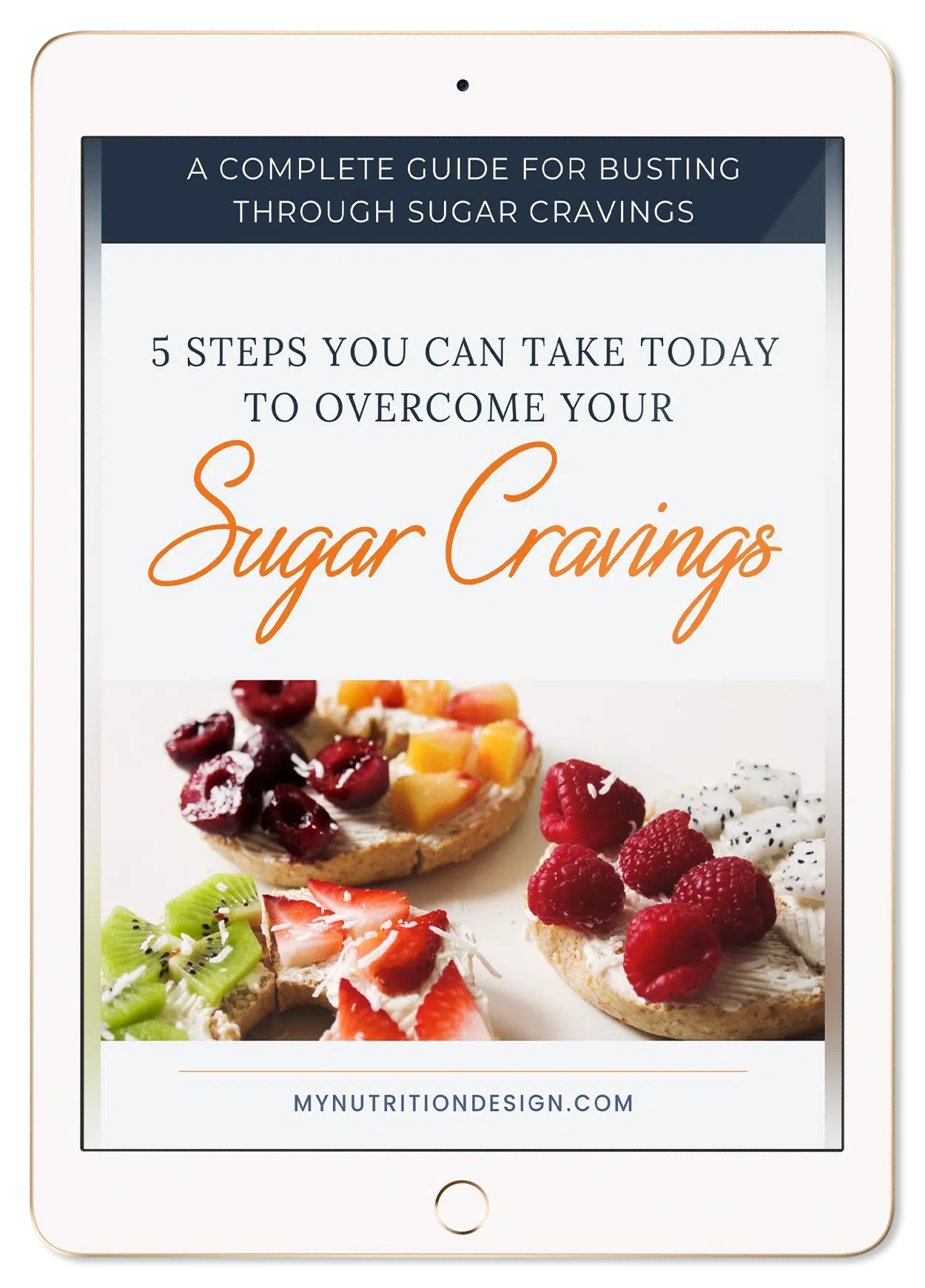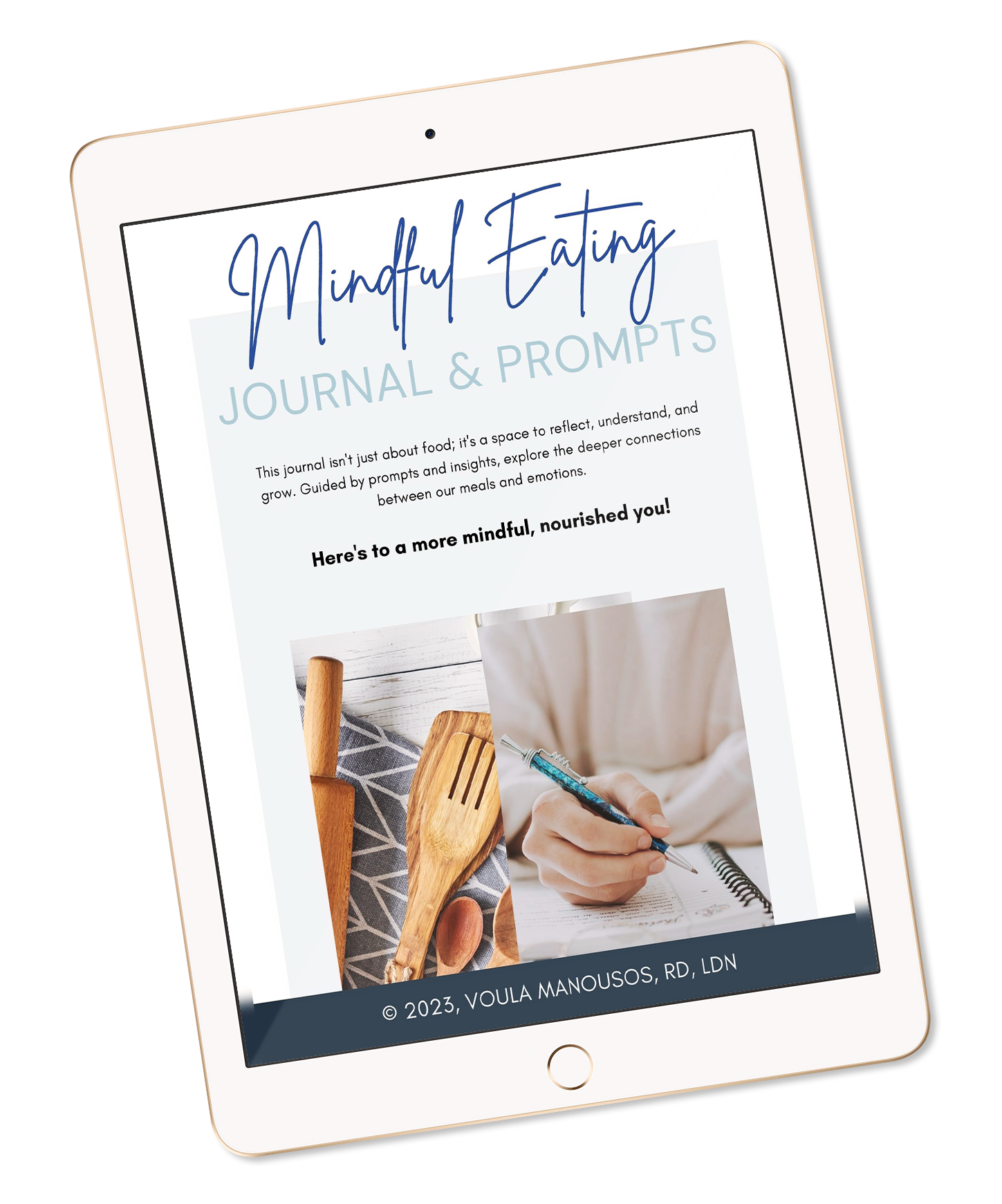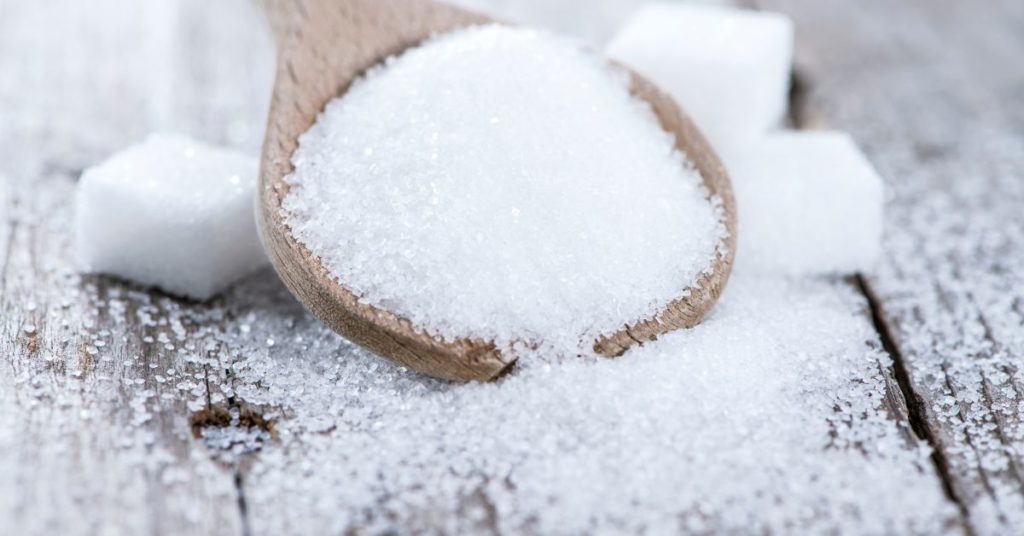
5 Ways to Stop Sugar Craving for Good
Do you wonder why you tend to crave that 3 pm candy bar or why you need to devour that pint of ice cream after dinner? Many of us crave sugar at different times of the day and wonder if we are addicted to it. An alarming statistic shows that the average American woman consumes about 70 pounds of added sugar every year. That’s four pounds a month! A study published in JAMA Internal Medicine showed that people who exceeded the recommended daily limit of added sugar (10% of total caloric intake) increased their risk of death due to heart disease by 30%. That’s not great for your waistline or your overall health. Now, are sugar cravings something we can manage or something we can do nothing about? Let’s look at why sugar cravings happen and 5 ways to stop a sugar craving in its tracks.
Why a Sugar Craving Happens
Hunger and Poor Diet Quality:
Do you feel you are being “good” by skipping breakfast and having soup or salad for dinner? If you do, you are setting yourself up for failure later on in the day. If you wait too long between meals or don’t eat enough at the last one, your body will crave the fastest fuel it can think of to quell the hunger. This is typically refined carbohydrates like sugar. We don’t crave chicken thighs and carrot sticks when we’re hungry, we crave sugar. Conversely, having an “all or nothing mentality” by forbidding all foods made with sugar, ultimately makes us crave them even more leading to bingeing on those high sugar foods you have tried to restrict – leading to weight gain, blood sugar problems, or other health conditions.
The quality of your diet is also key in managing sugar cravings. For example, if your diet has a higher ratio of carbohydrates or refined carbohydrates to protein or healthy fats, this can increase your hunger and ultimately your sugar cravings. If you’re craving sugar within an hour or two after a meal, you may want to think of what might have been missing in that prior meal.
We don’t crave chicken thighs and carrot sticks when we’re hungry, we crave sugar.

Nutrient Deficiencies Lead to Cravings for Sugar:
Nutritional deficiencies in certain minerals like zinc, chromium, iron, calcium, and magnesium may lead to sugar cravings. If you’re craving chocolate, for example, it could mean your body is deficient in magnesium.
When our body doesn’t get enough magnesium, it will have trouble bringing energy into the cells which can lead to sugar cravings in order to raise energy levels. So making sure we are getting the right nutrients can also curb those cravings!
Even if you have a healthy diet overall, adding fresh food and snacks like almonds, grapes, apples, spinach, apricots, fruit juices, and other healthy foods on a regular basis help stave off sugar cravings.

Habits and Sugar Craving
Sugar cravings can also be the result of classical conditioning over time because they feel rewarding and have now become a habit. As Dr. Michael Crupain describes it,
“You’ve got a stimulus, a behavior, and a reward. In the case of sugar cravings, the stimulus could be finishing dinner, the behavior could be eating sweets, and the reward could be how you feel-which in this case is good”.
The “feel good” hormone which is released after indulging in dessert or other sweet food is dopamine which turns our behavior of eating sugar into a habit. As a result, every time we eat a meal or have a snack, if we engage in the behavior of eating sugar, we will feel good. In short, you may be craving sugar because your mind and body have been trained to crave it.
Does Lack of Sleep Cause Sugar Craving?
Do you find yourself wanting a tall sweet mocha latte and a danish for breakfast after a poor night’s sleep? This may be because your body is tired and needs a boost of energy. A lack of sleep is linked to sugar and carbohydrate cravings that can lead to overeating. Studies suggest that sleep deprivation is linked to hunger (especially sweet cravings), because of hormonal shifts in the body. Ghrelin, the hunger-control hormone tends to increase, causing you to eat more and have excess sugar consumption. Leptin, the appetite-suppressing hormone, decreases. Cortisol, a stress hormone, may increase which stimulates your appetite.
Without adequate and good quality sleep, we’re more likely to eat more calories and crave quick energy in the form of sugary food instead of healthy alternatives like fruit, meat, or fiber-rich food.

Does Stress Cause Cravings for Sugar?:
If you’ve ever wondered why you crave a huge bowl of ice cream or a plate of brownies after a tough day, it might have something to do with your serotonin levels. Serotonin helps regulate mood, so it makes complete sense that our body craves sugar when we are anxious, depressed, or stressed. Lower levels of serotonin have been known to cause sugar cravings. Diets that are rich in refined sugar improve mood and can alleviate anxiety. Sugar can help you feel less anxious by suppressing the hypothalamic pituitary adrenal (HPA) axis in your brain, which controls your response to stress.
Researchers at the University of California, Davis found that sugar reduced stress-induced cortisol secretion in healthy female participants, minimizing feelings of anxiety and tension. Cortisol is known as the stress hormone.
Although it is easier said than done, being able to manage your stress can definitely help curb those sugar cravings and have better nutrition overall.

5 Ways to Stop Sugar Craving (That are Actually Good for Your Health)
If you find yourself raiding the cookie drawer several times a week or even several times a day, please consider these 5 things you can do to almost instantly stop the sugar craving in its tracks.
1. Don’t Starve Yourself – Eat Healthy Food and Snacks
If you go too long without eating, your body will crave the quickest form of fuel it can find in order to provide energy to the body. This is usually refined carbohydrates like sugar in the form of sweets, cookies, and chips. Make sure to eat regularly and to include a source of protein and healthy fats in your meal to keep you satisfied for longer. Eat foods like berries, oats, pistachios, quinoa, avocados, and beans that can help curb sugar cravings. These foods contain either fiber, protein, or healthy fats that are known to keep you fuller longer and curb those cravings.
2. Listen To Your Body
According to Webster’s Dictionary, a craving is “an intense, urgent, or abnormal desire or longing”. Just because you’re having a craving for sugary foods doesn’t mean you have to eat a bag of chocolate to keep your taste buds happy. Take a moment to understand what is really going on. Has it become a habit to have something sweet after a meal? Do you have a headache, are you thirsty, stressed, or bored?
Making space to listen to your body and acknowledge what might be going on will give you the answer to why you are craving sugar and what to do instead. Try having a glass of water, going for a walk, or spending time doing something you enjoy after a meal instead and see how you feel.
3. Get Good Sleep to Stave Off Sugar Addiction
Sleeping through the night and getting at least 7-9 hours of sleep per night will keep cortisol levels low and craving for sugar and fat sidelined. If you can’t get to sleep, consider shutting down all screens at least 2 hours before you go to bed and engage in consistent relaxing nighttime rituals like reading, listening to soothing music, or taking a relaxing hot shower or bath before bed.
4. Manage Stress and Focus on Your Health
Try to lead a healthy, positive lifestyle and those cravings will go away if the body is not responding to stress. Try exercise, meditation, or journaling to help settle yourself down in stressful moments. You may find that you don’t turn to sweet foods as often and as a result, you reduce your sugar intake without feeling like you’re depriving yourself.
5. Divert Your Attention
Sometimes turning to something different when craving sugar can help the cravings subside or even completely go away. Consider going for a brief 15-minute walk. The walk can pep you up and may even help you forget about the brownie or the cookie. It can also help reduce stress and get you moving which is ultimately a “win-win” situation!
Fruits, Fiber, and Proteins That Help Stop Sugar Craving
Don’t let a sugar craving get in the way of achieving your ultimate health goals. Here are 3 foods that can help satisfy your hunger, regulate your blood sugars and keep those sugar cravings at bay.

1. Sweet Potatoes:
Sweet potatoes are a great source of vitamins and minerals and have a natural sweetness that most can’t resist. They are also a great source of fiber (4 grams of fiber in a medium sweet potato according to the USDA, which can help control your blood sugars and stave off hunger. Consider baking, roasting or air frying and don’t forget to keep the skin on!
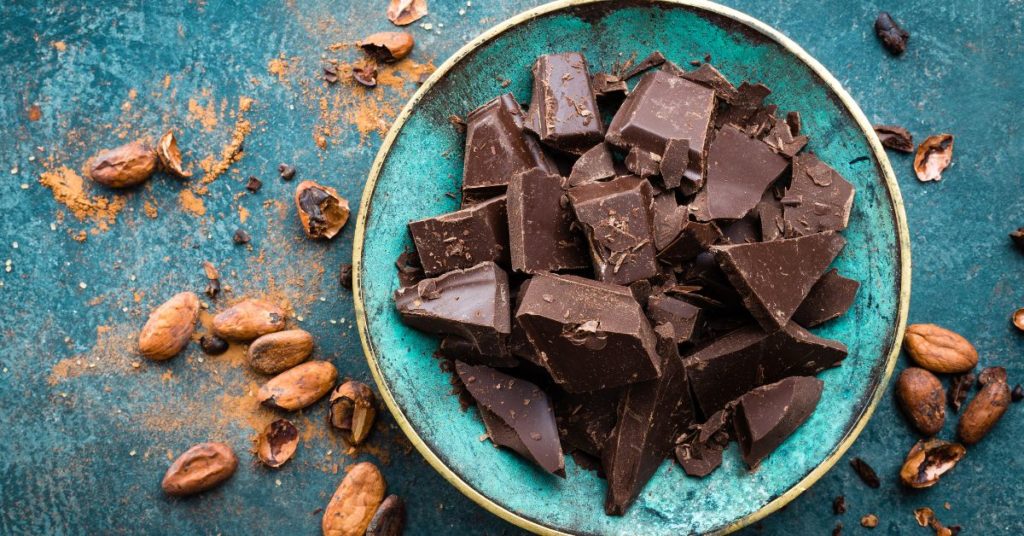
2. Dark Chocolate:
If cravings for chocolate are driving you mad, opt for some good quality dark chocolate. Dark chocolate has less added sugar than milk chocolate. If consumed in moderation, it can help satisfy that sweet tooth by boosting your dopamine and serotonin without driving up your blood sugars. Plus, because it contains magnesium, it can help address a deficiency that may be driving sugar cravings.
Shoot for one square (1 oz) of dark chocolate that contains 70% cacao to maximize your health benefit!
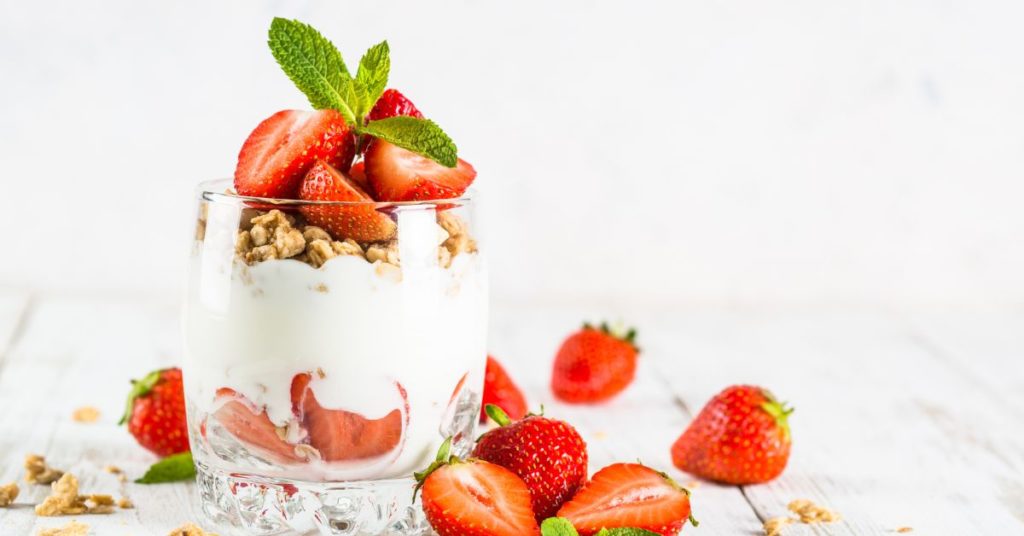
3. Greek Yogurt:
Getting enough protein can definitely stop your sugar craving. Carbohydrates are easily digested while protein and fat take longer to get through your gastrointestinal tract so you feel fuller longer. According to the USDA, ½ cup of Greek yogurt provides 9 grams of protein, which makes it an excellent food to ward off sugar cravings.
Try to avoid yogurts with artificial sweeteners which can drive sugar cravings and negatively affect the gut microbiome. Instead consider adding fruit for a hint of sweetness or other mix-ins like cinnamon, vanilla extract, nuts or seeds.
Stop Sugar Craving: Final Thoughts
Understanding why you might be craving sugar is the first step to stop or at least reduce those cravings for sugary snacks. Eating a variety of filling and sustaining foods, getting good sleep, and minimizing stress are some steps to get you there. Also, recognizing ingrained eating patterns and habits that lead to sugar cravings and creating space to understand what is happening, can also help you get the information you need to stop those cravings in their tracks!
If you think you need a helping hand in understanding how food is affecting you and what to eat to help you manage your weight, feel free to reach out. It’s what I do.

